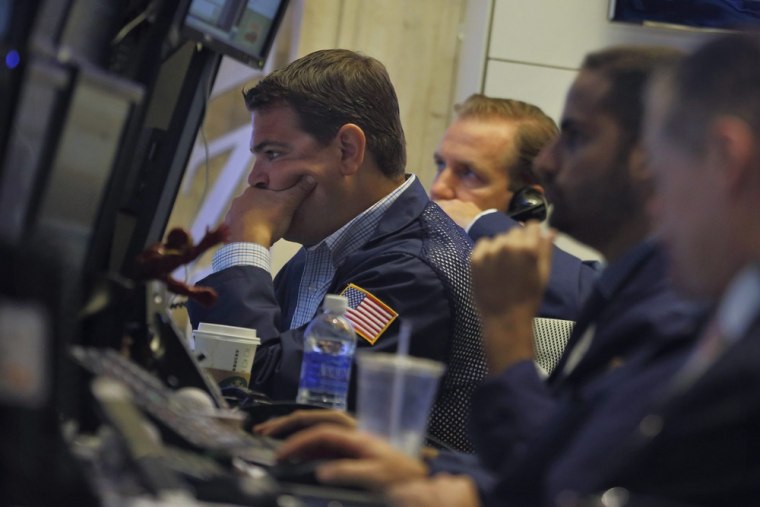Stocks finished sharply lower for a second session on Tuesday, with the Dow falling 170 points and hitting a two-month low, amid escalating worries over potential U.S. military action in Syria.
Missile strikes against Syria could be launched “as early as Thursday,” senior U.S. officials said as the White House intensified its push toward an international response to the suspected use of chemical weapons.
The “three days” of strikes would be limited in scope, and aimed at sending a message to the regime of Syria President Bashar Assad, U.S. officials told NBC News.Defense Secretary Chuck Hagel told the BBC the U.S. military is "ready to go" if President Barack Obama orders action over a chemical weapons attack in Syria.
(Read more: Cramer: This is the 'go-to' sector, despite Syria)
The Dow Jones Industrial Average closed won 170 points, or 1.14 percent, led by Bank of America and Microsoft. The blue-chip index posted its 13th decline this month, the most number of drops in a month since July 2012.
The S&P 500 also fell over 1.5 percent and the Nasdaq dropped 2.16 percent. The Dow and S&P 500 are on track for their biggest monthly declines since May 2012.
The CBOE Volatility Index (VIX), widely considered the best gauge of fear in the market, spiked near 17.
Most key S&P sectors were in the red, dragged by techs and financials.
Art Cashin, director of floor operations at UBS Financial Services said he is worried about the situation in Syria, calling it "another wide-open variable."
"I know some people are dismissing it as an excuse for a market that was looking to go down, but I think if you look at things like the spread between Brent and West Texas (crude oil) beginning to spread out, that tells you there is some real concern," he said.
(Read more: Cramer: This is the 'go-to' sector, despite Syria)
Oil prices settled above $109 a barrel, its best one-day gain of the year, amid worries that potential military action in the Middle East could disrupt oil production.
John Kilduff of Again Capital said that Syria's location was vital, even though it is not a major oil exporter.
"It's clearly become a proxy war for almost the whole region," said Kilduff. "What's happening is you have Egypt and Syria that are not oil producers…You have a tight market and two significant flash points, and it keeps getting undermined by things like the problems with the Libyan oil, the lack of Iranian oil."
(Read more:Is a spike in oil prices around the corner?)
And Treasury prices gained. The benchmark 10-year Treasury yield eased to to 2.76 percent from 2.79 percent late Monday. Separately, the Treasury auctioned $24 billion in 2-year notes at a high yield of 0.386 percent. The bid-to-cover ratio, an indicator of demand, was 3.21, versus a recent average of 3.48.
Gold prices rallied to a 15-week high as the geopolitical tension sparked a flight to safer investments. European stocks suffered their biggest daily drop in two months.
(Read more: Get ready for a'massive interest rate shock' soon)
Patrick Kernan of Cardinal Capital who trades S&P 500 options said the CBOE pit has been busier Tuesday than in recent sessions.
"But it is by no means crazy," he said. "Customers were buying short-dated options this morning and as the day progressed, people have been buying longer-dated options, to the end of the year. They've been moving their volatility buys further out."
Investors seem to be protecting more against a downside move, he said.
On the economic front, home prices gained 0.9 percent in June on a seasonally-adjusted basis, according to the S&P/Case Shiller composite index. On a non-adjusted basis, prices rose 2.2 percent. Compared to a year earlier, prices were up 12.1 percent, in line with economists' expectations.
(Read more:As investors shift,housing is the new stock market)
And consumer confidence gained to 81.5 in August, according to the Conference Board, topping expectations for 79.1.
Monday's weaker-than-expected manufacturing data boosted hopes for a later start to the scaling back of Federal Reserve asset purchases.
(Read more: US durable goods plunge in July, cash shadow over Q3)
"Recent data releases are consistent with the U.S. economy still remaining in a soft patch in early third quarter. However, it only marginally argues against the Fed tapering quantitative easing in September," said Bank of Tokyo-Mitsubishi's Lee Hardman in a research note.
(Read more: Insider says Summers may be named Fed chief soon)
